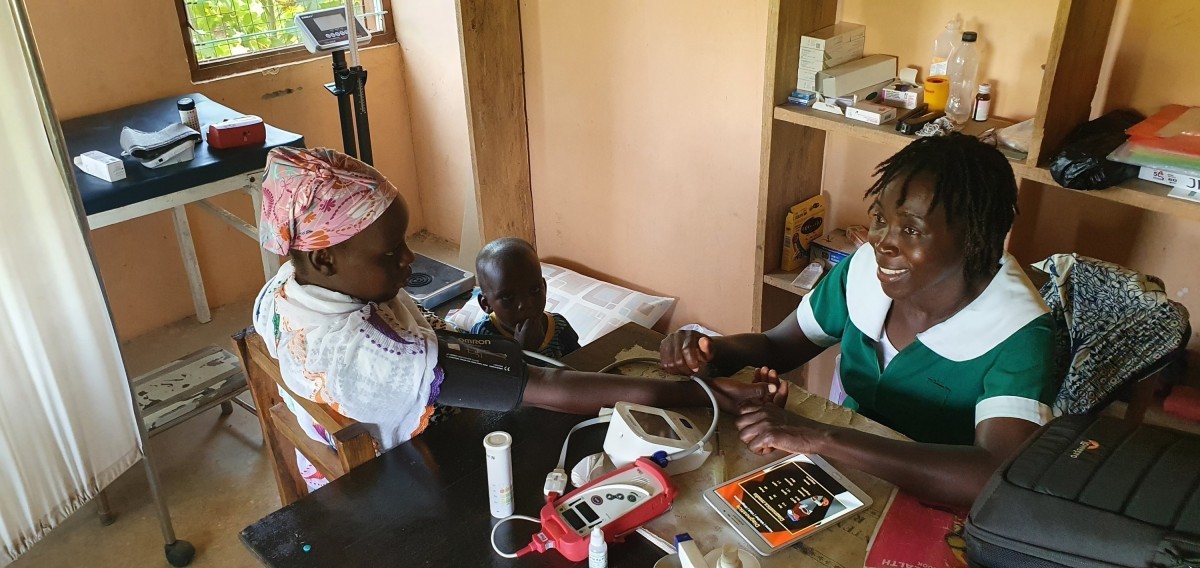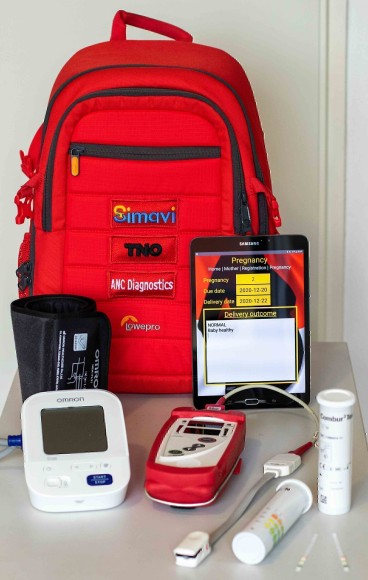Proper prenatal care for women in Ghana – thanks to an innovative backpack.
Check2Gether (C2G) is an innovative backpack that provides pregnant women in remote villages in Ghana with essential prenatal care close to home. These women often don't have the time, money or access to transportation to get medical check-ups. With the C2G backpack, a village nurse or midwife can do these check-ups in the remote villages. This allows early detection of problems, meaning pregnant women get the healthcare they need.
Check2Gether ensures essential care close to home for safe pregnancies
Contribute to safe pregnancies

Launch of check2Gether in Ghana
Check2Gether has been enthusiastically received in Ghana. The C2G project was launched with the help of our local healthcare expert (PHS), along with the local healthcare workers group and healthcare department. Our Simavi team was led by Loan Liem.
C2G contains tests that identify complications in pregnancy. The tests are non-invasive (so no needles are required), and a trained village nurse can easily administer them. Bloodwork results, a risk profile and accompanying advice is provided by a mobile app.
Activities in Ghana
Decision tree for mobile application of C2G
A decision tree has been set up for the mobile application that is linked to the C2G tests. This means that the right advice can be given, or women can be referred to a clinic or hospital when needed.
Training courses and support materials for local healthcare workers
We also developed videos, instructions and reading materials in order to train midwives and village nurses in how to use the backpack. In addition, we give a separate training to supervisors on how to monitor use of the C2G and how to provide follow-up care for high-risk pregnancies so that the women get proper .care In September, Loan Liem of Simavi was on location in the area where the backpack has been introduced in order to see how C2G can be integrated into the current healthcare system in Ghana.
'If we introduce it in my clinic, the consultation will only take 10 minutes, which means that most people will come in for a check-up. It's easier, really easy and the knapsack isn't heavy, it can be carried quite easily.'
Follow-up of launch and distribution Check2Gether
In order to guarantee success in the long run, there is also a handbook available to prevent common mistakes. In addition, we are organising gatherings for women where there are checks with the C2G and where the mothers exchange experiences and advice.
And we are going to keep developing Check2Gether. In a follow-up training course, we will be asking local healthcare workers for their first experiences, results and problems that they encountered. So that we can make improvements.
'It's a good activity, because right away I found out that my blood count was low, and I got advice on what I can do about it.'
Creating broad support
In order to ensure success, it's important that the project is broadly supported. Therefore, a number of different steering groups have been set up in Ghana to create support at the national, regional and district level.
The purpose of these committees is to issue advice and provide input about the implementation, upscaling and sustainability aspects of this intervention. Because as district supervisor Isaac says: 'Check2Gether means that women don't have to travel long distances. If they are asked to visit a different clinic than the one they are used to, it also has an effect on their blood pressure.'

What is Check2Gether
The purpose of Check2gether is to improve access to prenatal care in remote villages in Ghana, so that risk factors can be identified at an early stage of pregnancy; the result is healthy mothers and newborns.
C2G contains tests that identify complications in pregnancy. The tests are non-invasive (so no needles are required), and a trained village nurse can easily administer them. Bloodwork results, a risk profile and accompanying advice is provided by a mobile app. The data is stored in a personal file that is used for prenatal monitoring and, where necessary, for referral.

